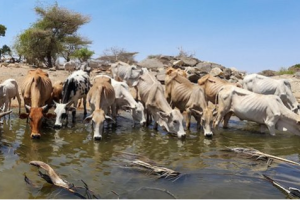Just a week after the new East African Community common external tariff (CET) band came into force, businesses are already feeling the pinch and crying foul over the “unintended consequences” of the regime.
Kenya and Uganda have filed complaints to the East African Business Council (EABC), the regional lobby, over the law that raised import taxes on goods from non-EAC countries to 35 percent. They say that some basic commodities outside the band have also been affected.
The bloc’s Trade and Finance ministers in May adopted 35 percent as the maximum rate for products classified under the 4th Band of the EAC common external tariff.
The CET, one of the key instruments of the Customs Union, is meant to foster regional integration through uniform treatment of goods imported from third parties. It also seeks to protect local manufacturers against competition from similar goods imported from outside the region.
According to experts, a 35 percent duty on imported finished products has the potential of growing intra-EAC trade by $18.9 million. In addition, the region’s industrial production will increase by 0.04 percent to $12.1 million and tax revenues by 5.5 percent.
It also has the potential to create an additional 6,781 jobs.
Affected products
The new band took effect on July 1 but consumers seem to not have been prepared for the price increment. The band features dairy and meat products, cotton and textiles, iron and steel, edible oils, soaps and beverages and spirits imported from outside the EAC.
Other commodities covered are furniture, leather products, fresh cut flowers, fruits and nuts, sugar and confectionery, coffee, tea and spices, textiles and garments, headgear, ceramic products and paints.
But Kenya and Uganda now say the new tax has pushed up the cost of importation, spilling over onto basic commodities.
The EABC has, in the past week, received letters from organizations raising concerns over the implementation of the common external tariff.
“Kenya is raising concerns over wood products while Uganda is concerned about industrial sugar. We are going to address the complaints after deliberations,” said John Bosco Kalisa, EABC’s chief executive.
Kenyan furniture manufacturer PG Bison Kenya Ltd says the increase of import duty on raw materials used to produce furniture products has forced it to increase prices of products.
“Due to these policy decisions, and along with the recent increases in fuel-related logistics and a rapidly depreciating local currency, our prices will change effective Friday, July 8, 2022. A revised price list will be issued and distributed accordingly,” the company told its customers in a notice.
Price reviews
Raw materials such as particleboard, plywood and block-board now attract a 35 percent import duty, up from 25 percent.
“The differential in tariffs that existed to incentivize value addition of raw materials has been removed,” said Amit Maru, the firm’s operations manager.
“We would like to bring to your attention that our prices need to be reviewed upward with immediate effect in relation to increased import duty on raw materials. The duties on raw materials are now the same as the rate that applies on a finished furniture item. The tariff calculation also allows for a rate to be applied per metric tonne or cubic metre, which can equate to a tax payable amount that can exceed the 35 percent value calculation,” he added.
“The two countries will have to retain their stay of application for sugar imports,” said Kalisa.
He, however, noted that there should be no cause for alarm “as it is still too early to tell the full impact of the new import taxes.”
“The issue is not the current CET; the issue is the classification and other new rates that are emerging that need clarity because everything could be wrongly blamed on the CET. The CET is very clear: There is no new point in increasing the prices of goods that are available in the region,” Kalisa said.
The 35 percent CET targets goods that are, available in the region and are produced in substantial volumes, including grains, potatoes, vegetables, maize and beans.
While the maximum tariff band at 35 percent was the most appropriate rate, it was noted that in its application, a welfare loss would be expected but would be cured from generated jobs from the switch to local production.
However, the rising cost of living due to global events such as the Russian invasion of Ukraine, higher crude prices, Covid-19, inflation and dollar shortage have complicated implementation of the CET.
EAC states domesticated the new tax measures in the Finance Act 2022, which became operational on July 1.
The Kenya Association of Manufacturers (KAM) has cited the Act as one of the major causes of high cost of living.
“Some of the tax measures in the Finance Act 2022 are set to have an impact on the manufacturing sector,” said Mucai Kunyiha, KAM chairman. “This is unlikely to spur growth in the agriculture and manufacturing sectors.”
Regional tax variance could be the new stumbling block to lowering the cost of food.
Last week, Kenya waived import levies on maize. The move, meant to improve supply to millers and in turn lower the cost of maize flour, may, however, have little impact as the variance in taxes charged on commodities by EAC states and new taxes on imports combine to further raise the cost of food.
Kenya’s main sources of maize imports are neighbors Tanzania and Uganda and Zambia further south.
In the past Nairobi has gone as far as importing maize from Mexico to alleviate shortages.
Shipments from countries that are not members of the EAC or the Common Market for Eastern and Southern Africa (COMESA) are usually subject to a 50 percent tariff. But Kenya waived import fees on white non-genetically modified maize of up to 540,000 tonnes until end of September as millers face an acute shortage of grain, but no vessel carrying maize is scheduled to dock at the Port of Mombasa soon.
A Kenya Ports Authority ship schedule seen by The EastAfrican shows no vessel carrying maize is expected to dock at the port before July 14.
The schedule indicates that Mombasa will handle majorly conventional cargo from July 4, with 16 vessels expected to call at the port. Five are oil tankers.
Major millers have had to stagger their operations while small ones have closed altogether.
“It is critical for EAC countries to support logistics for importation of maize from different countries to lower cost of flour. The cost of ferrying maize from Tanzania to Kenya has become expensive as the countries operate disparate tax laws,” they said in a statement.
Last week in a webinar on domestic tax regimes and proposed measures for 2022/23 budgets for the partner states, EABC too urged for harmonized taxes in the region to improve intra-EAC trade.
The lobby’s CEO said the EAC Treaty obliges partner states “to harmonize their tax policies to remove distortions and bring about more efficient allocation of resources within the bloc.”
With harmonization of the CET, all member states are supposed to levy 35 percent on goods manufactured outside of the region that can be produced locally. It means countries that had a lower tariff have had to raise it, adding to the rise in price of goods such as fuel, which directly affects the cost of food as transporters pay more to transport commodities like maize.
Kenya has traditionally restricted purchases to cushion local maize growers but at a cost to consumers who are forced to pay a higher cost for the cereal.
THE ETHIOPIAN HERALD TUESDAY 12 JULY 2022




